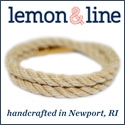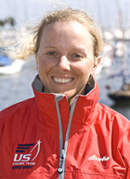
|
|
|
Scuttlebutt News: Conversations within the sport of sailing - Erin Maxwell It is often said how sailing is unique as a sport, where the opportunity is readiliy available to compete against the very best in the sport. Occassionally we get the chance to chat with them too.
It is hard to pinpoint any one thing that caused us to fall short at the Trials in '07. We had trained incredibly hard with all of our hearts every day leading up the event, had been performing really well in practice against top international teams, were in great physical shape, had a boat that was finely tuned, a great coach, great team dynamic, I could go onÖ But, I can say one thing with certainty, Amanda Clark and Sarah Mergenthaler, who came up the winners, sailed an amazing event. It was probably the best I have ever seen them sail. People have asked me if I regret not sailing full-time sooner before the Trials and if I thought the outcome would have been different if we had trained as a team for longer before the Trials. But, I think the result at the Trials would likely have been the same. We sailed a good regatta, I wouldn't say it was our best, but we sailed well. It just turned out that the Trials was "their event," and not ours. There were definitely things about our performance that could have been improved that would have gotten us closer to a win. I think Amanda and Sarah had a better understanding of determining the large persistent shift on windward legs than us. And, our risk management skills could have been better during the event. I think to some extent, it took losing the Trials and reliving each race in our heads in the months following to really fully appreciate the risk/reward of some tactical situations. We are better racers today because of it. The US Trials was also a small fleet, only 13 boats, which had a large gap in skill from the front to the back of the fleet relative to most international events we sail. So, I think in comparing our recent results versus the Trials, our skill set as a team plays better to big fleet tactics, managing traffic on the course, and starting on dense starting lines that pay a premium for being front row. So, the Trials format didnít play well for our strengths. At the Trials, starting well didnít pay the same comparable dividends that it would in an international fleet, since you could take one tack after a bad start and have a clean lane for the rest of the race. In an international fleet, a poor start could see you doing 10 tacks before you get a clean lane and spending the rest of the race fighting the herd -a vastly different type of racing skills than are required at the Trials for success. The US Trials puts a large premium on boat speed since itís such a small fleet. Although our speed is a strength of ours as a team, it isnít what makes us stand out. We are one of the top 10 fastest teams in the world in most wind velocities, but there are very few conditions that we are top 3 in the world in boat speed. Hence, why when you look at our race scores from Sail Melbourne, The Worlds, The Delta Lloyd Regatta, youíll see very few race wins but also very few races out of the top 10. The Trials were sailed in relatively flat water and 6-10 knots for almost every race of the event. Amanda and Sarah are a really talented team both upwind and downwind in those conditions, one of the best in the world, and had a small edge on us in speed at times. I think that made us search for a tactical advantage that was hard to find in the small fleet, and sometimes resulted in us taking risks that didnít have the appropriate reward ratio associated with them. Itís easy to run yourself in circles reflecting on an event, but Amanda and Sarah deserved to win the event with the way they sailed and peaked for the Trials. They sailed amazingly, and that is the reason why the US Trials system was designed. Itís the hope that a team that can peak for a one event, winner-take-all, can also peak for the same scenario at the Olympic Games. Sometimes it takes losing something that means everything to you to force you to look in the mirror and dig deeper for perfection to prevent feeling that kind of pain again. We have a few motivations. First of all, sailing is fun. We enjoy sailing together and look forward to every day we get to spend on the water. I use all my vacation days from my job for 470 regattas. I canít think of a better ďvacation day.Ē Secondly, we have a little bit of ďunfinished business.Ē We have the same dreams of most campaignersÖ an Olympic medal. And, although Iz has been to the Games in 2004, I have never been. I have had the dream of getting to walk in the opening ceremonies with the rest of the US Olympic athletes in team uniform from as young as I can remember. Getting to represent your country at the highest level on a world stage is pretty cool. We will hopefully get that chance and make all our supporters who have stood by us through the many years proud. Time in the boat! Being successful at an international level in sailing takes years of practice. Clearly sailing is a sport where experience pays. We are just now beginning to enjoy all the years of hard work to get better in the 470 class. A lot of that is thanks to Coach Skip Whyte. I started sailing 470ís before the í99 Trials, Iz started in í01. Where we are today is a product of the many days of dedicated coaching from Skip. We unfortunately donít get to have his coaching as often anymore, but we still hear his words in our heads as we travel around a race course. Good question. I have often wondered the same thing. Some of it just might be cyclical with the sailors that are competing now. In other quads men have performed stronger than the womenís teams overall. The US also has built a strong system of Junior Womenís sailing competitions and clinics. And we have strong womenís college sailing that most other countries lack. Maybe itís now paying dividends? For instance, many of our successful Laser Radial sailors in the US, attended the Leiter Cup (US Womenís National Junior Single-handed Championship), growing up as junior sailors. Then the Radial became an Olympic Class, which gave us a leg up as a country against other countries that didnít already have this sort of event already established in the Radial. This is not to take anything away from Anna and Paige, who have been nothing short of outstanding over the last quad. They are just in another league and would succeed regardless. I was more speaking to the fact that we probably have 20 women in the US that can compete in the top 100 Radial sailors in the world versus some of the other Olympic Classes where we certainly donít have this same kind of depth. A LOT is being juggled. We have more on our plates than your average campaigner by 2 or 3 fold. We are both working hard on careers and busy in our personal lives. I work full time as a commodities trader for 12 hours/day. Isabelle is in law school full-time at NYU, one of the top law schools in the country. She is doing well there, a testament to the hard work she is dedicating to her studies. She just started her summer internship with a judge this week. I got married this past fall to Brit Bischoff and Isabelle is getting married in a couple weeks to Jonathan Farrar. Needless to say, wedding planning has added to our hectic schedules over the past year. We both coach sailing on the side as well to help make some extra money. I own two dogs that are a lot of fun but a lot of work, Isabelle has another side job doing legal research, the list goes on! Itís been a challenge to fit in practice time on the water, and time in the gym. This schedule isnít going to get any easier any time in the near future, but we are working out ways to be as efficient as possible and find a balance in our lives to make it work. Itís important to us to be successful in areas of our lives outside of sailing. 
Click here to submit your Letter to the Editor back to top |







|


